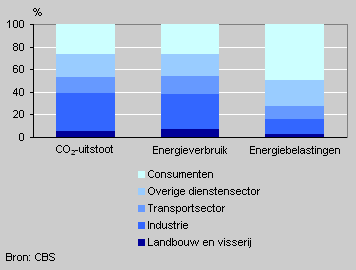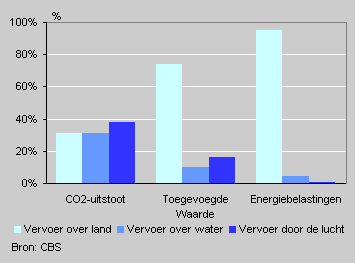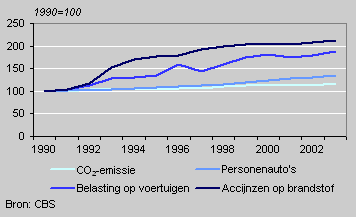Inequitable distribution of energy taxes

The principle that the polluter pays does not always apply. This becomes evident if a comparison is made between those responsible for the emission of CO2 and those who pay the highest energy tax rates. The amount of energy tax paid by consumers is too high in relation to the amount of CO2 emitted by consumers.
CO2 emission, energy use and energy taxes by sector, 2003

Small contribution by manufacturing industry
In the Netherlands the emission of the main greenhouse gas, carbon dioxide (CO2), is directly linked to energy use, thus it is easy to monitor the relation between energy tax and CO2 emission.
Consumers account for 27 percent of total CO2 emission but pay half of total energy taxes. The sector manufacturing industry, on the other hand, accounts for 32 percent of total CO2 emission but pays only 13 percent of energy taxes. The sectors agriculture and fisheries, too, are undertaxed in proportion to the amount of carbon dioxide they produce, 6 and 2 percent respectively.
One of the reasons for this disproportion is that tax rates imposed on large energy consumers and households vary considerably. Per ton of CO2 emitted households pay 75 euro on energy taxes, whereas manufacturing industry pays only 16 euro.
CO2 emission, value added and energy taxation in the transport sector, 2003

Inequitable distribution in the transport sector
In the transport sector transport by air and transport over land and water contribute almost equally to total the emission of carbon dioxide. Nevertheless, road transport is paying almost the entire amount of energy taxes in the transport sector, although, relatively speaking, it makes the most substantial contribution to Dutch economy. Road transport pays over 98 euro for each ton of CO2 emitted. Transport by waterways and by air pay 4 euro and 0.4 euro respectively. This is due to a low excise rate on fuel oil, gas oil for ships and kerosene for aircraft.
Number of cars, CO2 emission, tax on fuel and motor vehicle tax

Car owners heavily taxed
Total revenues from excise duties on motor fuels and taxes on motor vehicles paid by consumers have risen by 89 and 113 percent respectively in 2003 compared to 1990. In 1990 consumers paid taxes on motor vehicles to the amount of 134 euro per ton of CO2 emitted and 104 euro on fuel excise duties. In 2004 these amounts have risen to 218 and 191 euro respectively.
Yet CO2 emission caused by motorists has risen in 2003 compared to 1990, though only by 16 percent. The main reason for the moderate increase in CO2 emission is that cars have become more fuel-efficient.
Sjoerd Schenau and Martine ten Ham